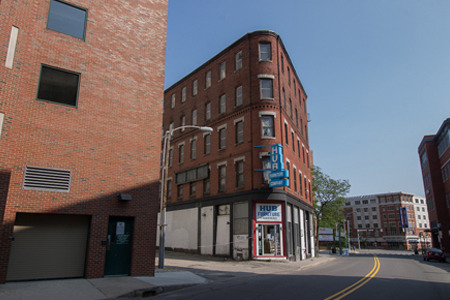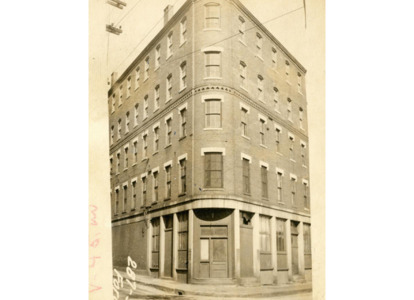Hub Furniture
BackHub Furniture
291 Fore Street
Walking along Fore St., beyond the impressive granite Customs House and the parking lot across from it, you get to 291 Fore St. and Hub Furniture.
This 50,000 square foot building, with its Italianate elements and modified flat-iron design, was built in 1866 for businessman and inventor John Bacon Curtis. Curtis, who was born in Hampden, Maine in 1827, is perhaps best known for commercializing chewing gum for the American mass market. Curtis’ is not a Jewish story, but it is a Maine one worth retelling.
As the story goes, Curtis and his father began experimenting with making chewing gum sticks out of spruce tree resin, paraffin and sugar, and marketed their product as “State of Maine Pure Spruce Gum”. Eventually he moved his business, Curtis & Son, to Portland and opened a chewing gum factory in this very building. The factory was active for fifty years and at its peak employed 200 workers, mostly young women. But the gum market grew fiercely competitive, and in 1911, Curtis was bought out by the Chicle company (creator of Chicklets gum, a major global brand well into the 20th century) in 1911. The workforce was halved, and the factory was closed in the 1920s. But some decades after the chewing gum era at 291 Fore Street ended, the furniture era began.
Hub Furniture was established at 318 Congress Street in 1913 by Samuel Novick and Max Simonds (or Sadowsky), two Jewish immigrants from the same village in what was then Russia, both born in 1889. Sam Novick had peddled tea in Portland neighborhoods from his horse-drawn wagon before the partnership with Simonds. In 1923, Hub moved to a very substantial storefront at 440 Congress Street, which was later razed for an urban renewal project in the late 1960s. After that, Hub moved to its home at 291 Fore where it’s still in business today, making it a survivor of the Great Depression, two world wars, and urban renewal programs that leveled two of its stores.
Samuel’s grandson, Sam Novick, says the huge building was relatively inexpensive when his father Jack bought it, largely because by then, this part of the Old Port had become unsafe and rundown. But the extra warehouse space was exactly what Jack was looking for; he could store a larger inventory on site, and thereby offer customers furniture at a lower cost than what they would find in a showroom. That’s called “warehouse pricing”, and it’s something Hub continues to this day.
Hub founder Samuel Novick died in 1945. To ensure the continuation of the business, his widow, Annie Novick, served as president and in 1951, bought out the Simonds family. Under the Novicks, Hub Furniture has remained the epitome of a family business. Their oldest son, David Novick, ran the business until his death in 1959, and Jack Novick and his wife Rose took over. Now, Hub is run by their son Sam and his wife Bette, and it continues to thrive, even as the surrounding area gentrifies.
For decades, the Novicks have quietly donated time, money, and furniture in Greater Portland. Hub Furniture celebrated its 100th anniversary on June 6, 2013, by throwing a “benefit bash” with proceeds donated to the Preble Street Resource Center (Stop D04), the United Way of Greater Portland and the Jewish Community Alliance of Southern Maine (Stop W10). National retail chains don’t contribute to the community in the way that a locally owned business like Hub Furniture can, Suzanne McCormick — then president and CEO of the United Way of Greater Portland —told the Portland Press Herald. “[The Novicks] are the epitome of why we want local businesses to thrive,” she said.

